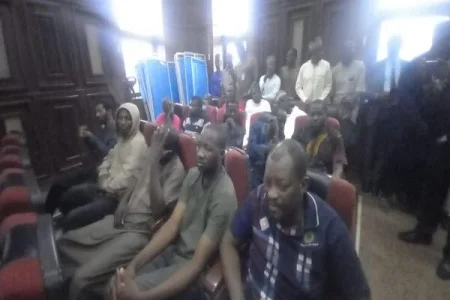
Ten #EndBadGovernment protesters in Nigeria face serious charges including treason. A Federal High Court has remanded nine men to Kuje prison and one pregnant woman to Suleja Correctional Service until September 11. The case, stemming from recent nationwide protests, raises questions about the balance between government authority and civil liberties.
A recent court decision has sent ripples through Nigeria's activist community. Federal High Court Justice Emeka Nwite has ordered the detention of ten #EndBadGovernment protesters until September 11. Nine male protesters will be held at Kuje prison, while a pregnant female protester has been remanded to Suleja Correctional Service.
This ruling follows the Federal Government's arraignment of the suspects in connection with last month's nationwide #EndBadGovernment demonstrations. The protesters face six counts, including serious charges such as treason, inciting mutiny, attempts to destabilize the country, intimidating the president, and destruction of public property.
During their court appearance, all suspects entered not-guilty pleas. Their legal representatives sought oral bail applications, arguing for the presumption of innocence. However, the prosecution countered, emphasizing the gravity of the charges, some of which carry capital punishment.
Despite defense attorneys' requests for police custody, Justice Nwite scheduled a bail application hearing for September 11. Until then, the suspects will remain in correctional facilities.
This case highlights the ongoing tension between government authority and civil protest in Nigeria. The charges leveled against the protesters are severe, potentially carrying significant consequences if convictions are secured.
The decision has sparked discussions about the balance between maintaining public order and protecting citizens' rights to peaceful protest. As the case progresses, it is likely to remain a focal point in debates about governance, civil liberties, and the right to dissent in Nigeria.




